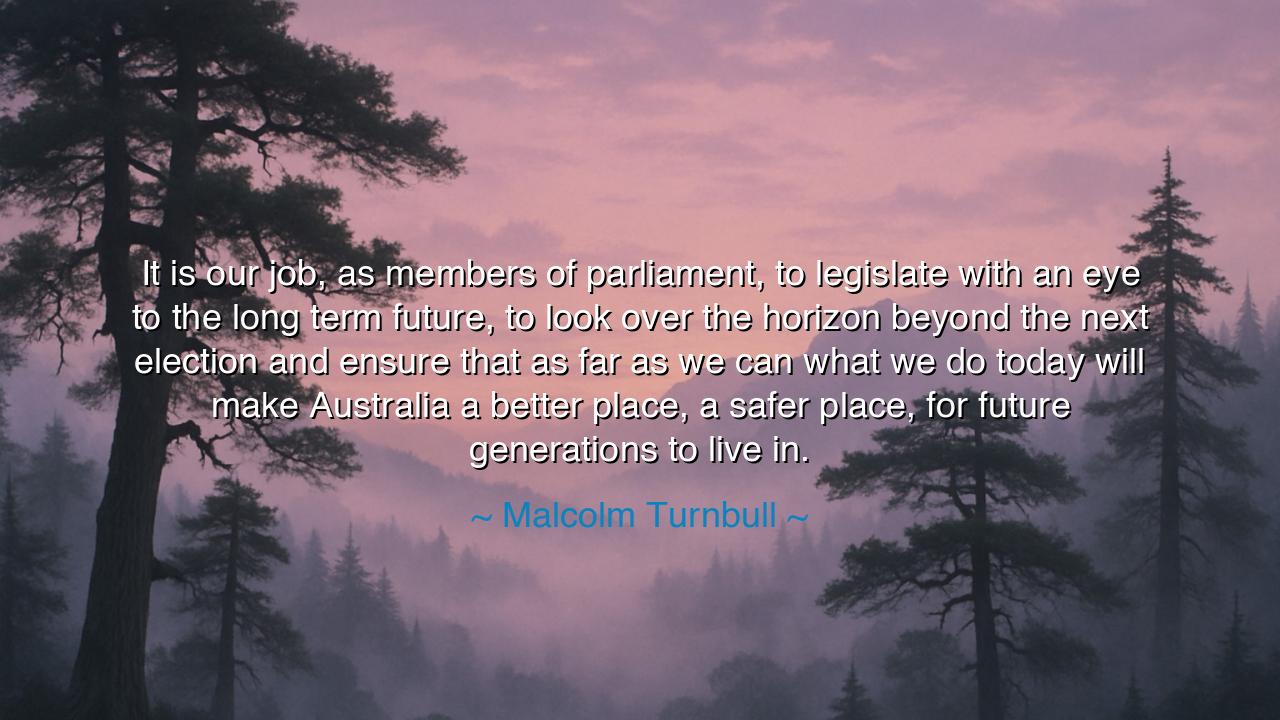
It is our job, as members of parliament, to legislate with an eye
It is our job, as members of parliament, to legislate with an eye to the long term future, to look over the horizon beyond the next election and ensure that as far as we can what we do today will make Australia a better place, a safer place, for future generations to live in.






In the sands of time, there is a recurring truth that the actions of today shape the future of tomorrow. Malcolm Turnbull’s words, “It is our job, as members of parliament, to legislate with an eye to the long-term future, to look over the horizon beyond the next election and ensure that as far as we can what we do today will make Australia a better place, a safer place, for future generations to live in,” speak to the vital duty of leadership—a duty not to the immediate demands of the present, but to the lasting legacy of the future. True leaders, he suggests, must have the foresight to act with the future in mind, ensuring that the decisions made today will benefit not only their generation but the generations yet to come.
In the ancient world, kings and philosophers alike understood that wisdom was found not just in understanding the present, but in perceiving the future as a living, breathing force. The great philosopher Plato wrote of the ideal leader, one who would not be swayed by the temporary pleasures of power, but who would act with virtue and a commitment to the welfare of the state. Just as a king would plant the seeds for his people’s prosperity long after his reign had ended, so too must the leaders of today take responsibility for the world they leave behind. In the words of the ancient Stoics, particularly Marcus Aurelius, “The time is a river of the past, running into the future. You must decide what you can do with your portion of that time.”
Take, for instance, the story of the Roman aqueducts. Built by ancient engineers and overseen by emperors who understood the importance of long-term planning, these aqueducts carried water to the heart of Rome for centuries. At the time they were built, no one could have known that they would still be in use millennia later, but the wisdom of those who planned them ensured that future generations would benefit from their foresight. Similarly, Turnbull’s call to legislate for the future requires the courage to make decisions that may not yield immediate rewards but will stand the test of time, shaping a future that is more prosperous, safe, and equitable.
In the history of ancient Egypt, the pharaohs often built monumental structures, like the pyramids, that would not only serve their reign but ensure their legacy would endure for millennia. These acts were not just about personal glory; they were about creating something that would stand the test of time, providing a foundation for future generations to draw strength from. The wisdom of those who govern lies in their ability to see beyond the current moment, to understand that their actions are part of a much larger timeline—one that will stretch long after their reign. Turnbull’s vision of long-term legislation reflects this ancient understanding: it is not about the here and now, but about ensuring that future generations inherit a world that is better than the one they were born into.
Consider the example of Nelson Mandela, whose leadership was not defined by short-term gains but by a long-term vision for peace and reconciliation in South Africa. Mandela could have sought vengeance for the injustices done to him and his people, but instead, he chose a path that would heal the nation and ensure that future generations would live in harmony. His leadership was not about the next election, but about building a country where freedom, justice, and equality could thrive for generations. Just as Mandela looked beyond the present conflicts to envision a more just future, Turnbull calls on leaders to act with the same vision and responsibility, recognizing that the choices made today will shape the world of tomorrow.
The lesson here is timeless: true leadership requires the courage to act with foresight, to consider the long-term consequences of our decisions, and to work toward a world that is better not only for ourselves, but for the future. Whether in governance, business, or personal decisions, we must ask ourselves: What legacy are we leaving? The decisions made today will echo through time, and it is our responsibility to ensure that they leave the world a better place—just as the ancient builders, philosophers, and leaders did for their descendants.
As we look to the future, let us take inspiration from the great leaders of the past who understood the importance of building for the long-term, of thinking beyond their own lifetimes. Like them, we must govern with vision, act with purpose, and always consider the generations to come. It is our duty to leave behind a world that is better, more prosperous, and more just, for those who will inherit the future we build today. Just as the ancient philosophers and leaders sought to shape the course of history through their actions, so too must we.






AAdministratorAdministrator
Welcome, honored guests. Please leave a comment, we will respond soon